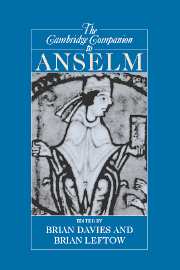Book contents
- Frontmatter
- Introduction
- 1 Anselm’s life, works, and immediate influence
- 2 Anselm on faith and reason
- 3 Anselm, Augustine, and Platonism
- 4 Anselm’s philosophy of language
- 5 Anselm on modality
- 6 Anselm’s perfect-being theology
- 7 Anselm and the ontological argument
- 8 Anselm’s account of freedom
- 9 Anselm on truth
- 10 Anselm on ethics
- 11 Anselm on the Trinity
- 12 Anselm on atonement
- Bibliography
- Index
4 - Anselm’s philosophy of language
Published online by Cambridge University Press: 28 May 2006
- Frontmatter
- Introduction
- 1 Anselm’s life, works, and immediate influence
- 2 Anselm on faith and reason
- 3 Anselm, Augustine, and Platonism
- 4 Anselm’s philosophy of language
- 5 Anselm on modality
- 6 Anselm’s perfect-being theology
- 7 Anselm and the ontological argument
- 8 Anselm’s account of freedom
- 9 Anselm on truth
- 10 Anselm on ethics
- 11 Anselm on the Trinity
- 12 Anselm on atonement
- Bibliography
- Index
Summary
INTRODUCTION
Anselm makes full use of the stock-in-trade of all philosophers: he identifies ambiguities and distinguishes various senses of words; he sometimes appeals to and sometimes rejects ordinary usage; he insists, often dogmatically, that some expressions are proper and others improper, and tries to legislate usage; he coins new words; he complains about how grammar and grammatical form can be misleading. No special theory of language need be behind such activities. Yet Anselm did have a general semantic theory that not only licensed these activities but also enabled him to address particular questions in the philosophy of language - how words are linked to the world, whether meaningful language has to be denotative, what makes true statements true, and the like. His philosophical dialogue De Grammatico is entirely devoted to the philosophy of language, as are parts of DeVeritate and his Philosophical Fragments. Even the Monologion contains extensive discussion of semantic issues. Anselm says virtually nothing about formal logic, but he takes up issues in the philosophy of language in nearly everything he wrote.
- Type
- Chapter
- Information
- The Cambridge Companion to Anselm , pp. 84 - 110Publisher: Cambridge University PressPrint publication year: 2004
- 3
- Cited by

